Analyzing Feminist Perspectives in International Relations: An Essay
VerifiedAdded on 2020/06/05
|15
|6432
|64
Essay
AI Summary
This essay examines the intricate relationship between feminist theory and international relations, exploring how gender dynamics influence global politics. It begins by defining feminism and its goals for gender equality, then delves into the historical context of women's roles and standing across various fields, supported by relevant statistics. The essay analyzes different feminist approaches and theories within international relations, discussing the importance of gender equality in world politics and its benefits. It also addresses patriarchy's visibility in international affairs and the reasons why international relations theory has been gendered. The discussion extends to the role of feminism in post-positivist approaches, addressing key concepts like liberal feminism, constructivism, and the three waves of feminist movements. The essay emphasizes the dominance of men in international policy-making and the historical marginalization of women's perspectives, concluding that feminist theory provides a critical lens for understanding and challenging these inequalities.
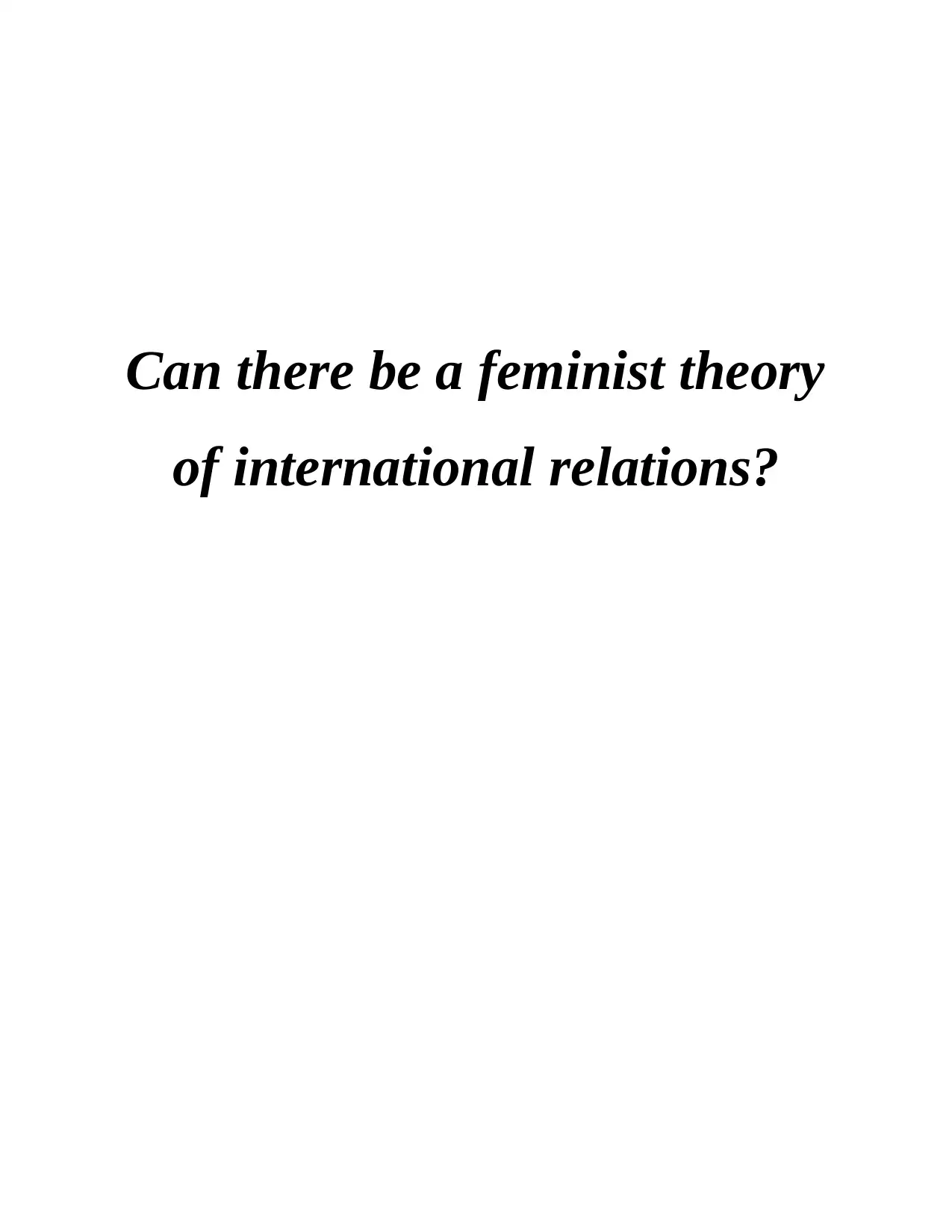
Can there be a feminist theory
of international relations?
of international relations?
Paraphrase This Document
Need a fresh take? Get an instant paraphrase of this document with our AI Paraphraser
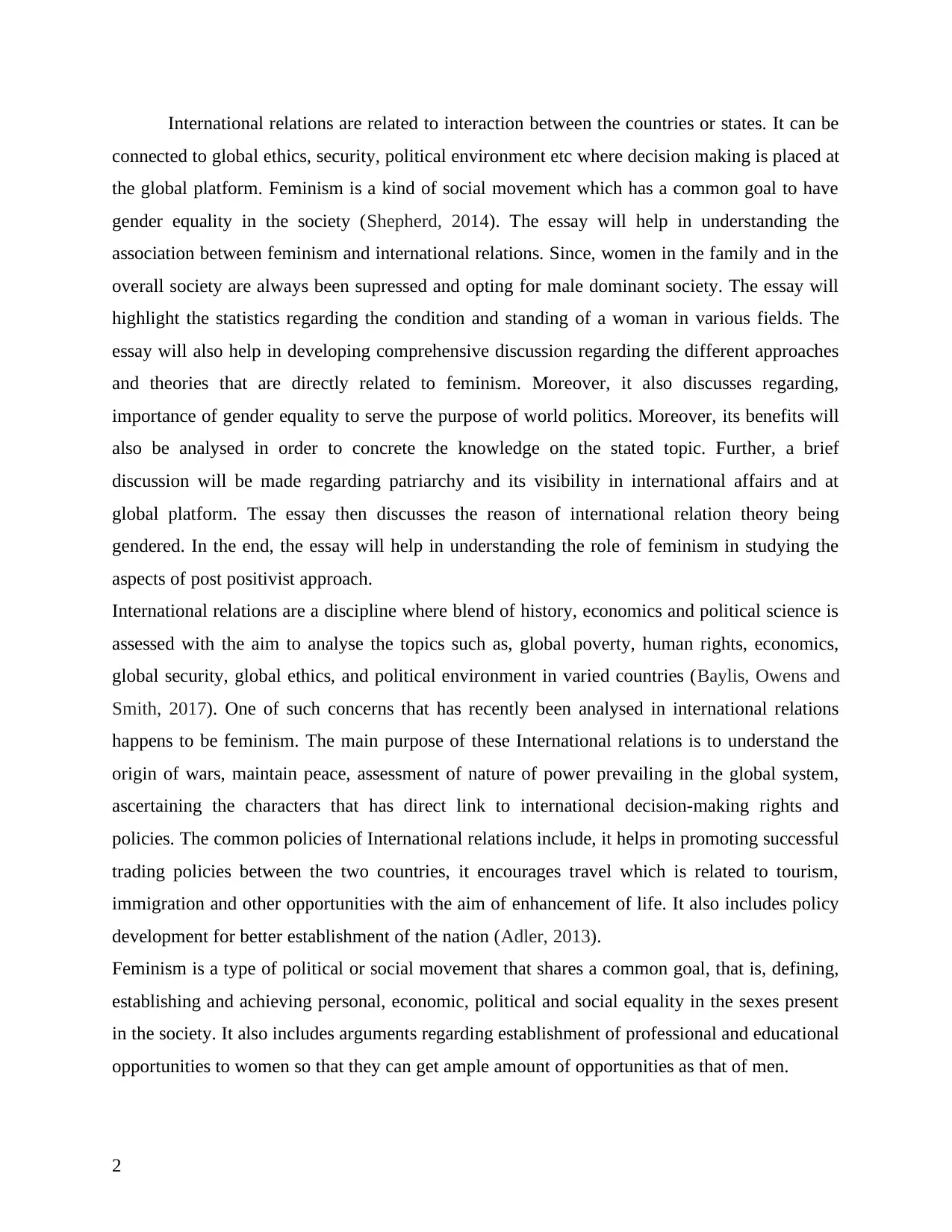
International relations are related to interaction between the countries or states. It can be
connected to global ethics, security, political environment etc where decision making is placed at
the global platform. Feminism is a kind of social movement which has a common goal to have
gender equality in the society (Shepherd, 2014). The essay will help in understanding the
association between feminism and international relations. Since, women in the family and in the
overall society are always been supressed and opting for male dominant society. The essay will
highlight the statistics regarding the condition and standing of a woman in various fields. The
essay will also help in developing comprehensive discussion regarding the different approaches
and theories that are directly related to feminism. Moreover, it also discusses regarding,
importance of gender equality to serve the purpose of world politics. Moreover, its benefits will
also be analysed in order to concrete the knowledge on the stated topic. Further, a brief
discussion will be made regarding patriarchy and its visibility in international affairs and at
global platform. The essay then discusses the reason of international relation theory being
gendered. In the end, the essay will help in understanding the role of feminism in studying the
aspects of post positivist approach.
International relations are a discipline where blend of history, economics and political science is
assessed with the aim to analyse the topics such as, global poverty, human rights, economics,
global security, global ethics, and political environment in varied countries (Baylis, Owens and
Smith, 2017). One of such concerns that has recently been analysed in international relations
happens to be feminism. The main purpose of these International relations is to understand the
origin of wars, maintain peace, assessment of nature of power prevailing in the global system,
ascertaining the characters that has direct link to international decision-making rights and
policies. The common policies of International relations include, it helps in promoting successful
trading policies between the two countries, it encourages travel which is related to tourism,
immigration and other opportunities with the aim of enhancement of life. It also includes policy
development for better establishment of the nation (Adler, 2013).
Feminism is a type of political or social movement that shares a common goal, that is, defining,
establishing and achieving personal, economic, political and social equality in the sexes present
in the society. It also includes arguments regarding establishment of professional and educational
opportunities to women so that they can get ample amount of opportunities as that of men.
2
connected to global ethics, security, political environment etc where decision making is placed at
the global platform. Feminism is a kind of social movement which has a common goal to have
gender equality in the society (Shepherd, 2014). The essay will help in understanding the
association between feminism and international relations. Since, women in the family and in the
overall society are always been supressed and opting for male dominant society. The essay will
highlight the statistics regarding the condition and standing of a woman in various fields. The
essay will also help in developing comprehensive discussion regarding the different approaches
and theories that are directly related to feminism. Moreover, it also discusses regarding,
importance of gender equality to serve the purpose of world politics. Moreover, its benefits will
also be analysed in order to concrete the knowledge on the stated topic. Further, a brief
discussion will be made regarding patriarchy and its visibility in international affairs and at
global platform. The essay then discusses the reason of international relation theory being
gendered. In the end, the essay will help in understanding the role of feminism in studying the
aspects of post positivist approach.
International relations are a discipline where blend of history, economics and political science is
assessed with the aim to analyse the topics such as, global poverty, human rights, economics,
global security, global ethics, and political environment in varied countries (Baylis, Owens and
Smith, 2017). One of such concerns that has recently been analysed in international relations
happens to be feminism. The main purpose of these International relations is to understand the
origin of wars, maintain peace, assessment of nature of power prevailing in the global system,
ascertaining the characters that has direct link to international decision-making rights and
policies. The common policies of International relations include, it helps in promoting successful
trading policies between the two countries, it encourages travel which is related to tourism,
immigration and other opportunities with the aim of enhancement of life. It also includes policy
development for better establishment of the nation (Adler, 2013).
Feminism is a type of political or social movement that shares a common goal, that is, defining,
establishing and achieving personal, economic, political and social equality in the sexes present
in the society. It also includes arguments regarding establishment of professional and educational
opportunities to women so that they can get ample amount of opportunities as that of men.
2
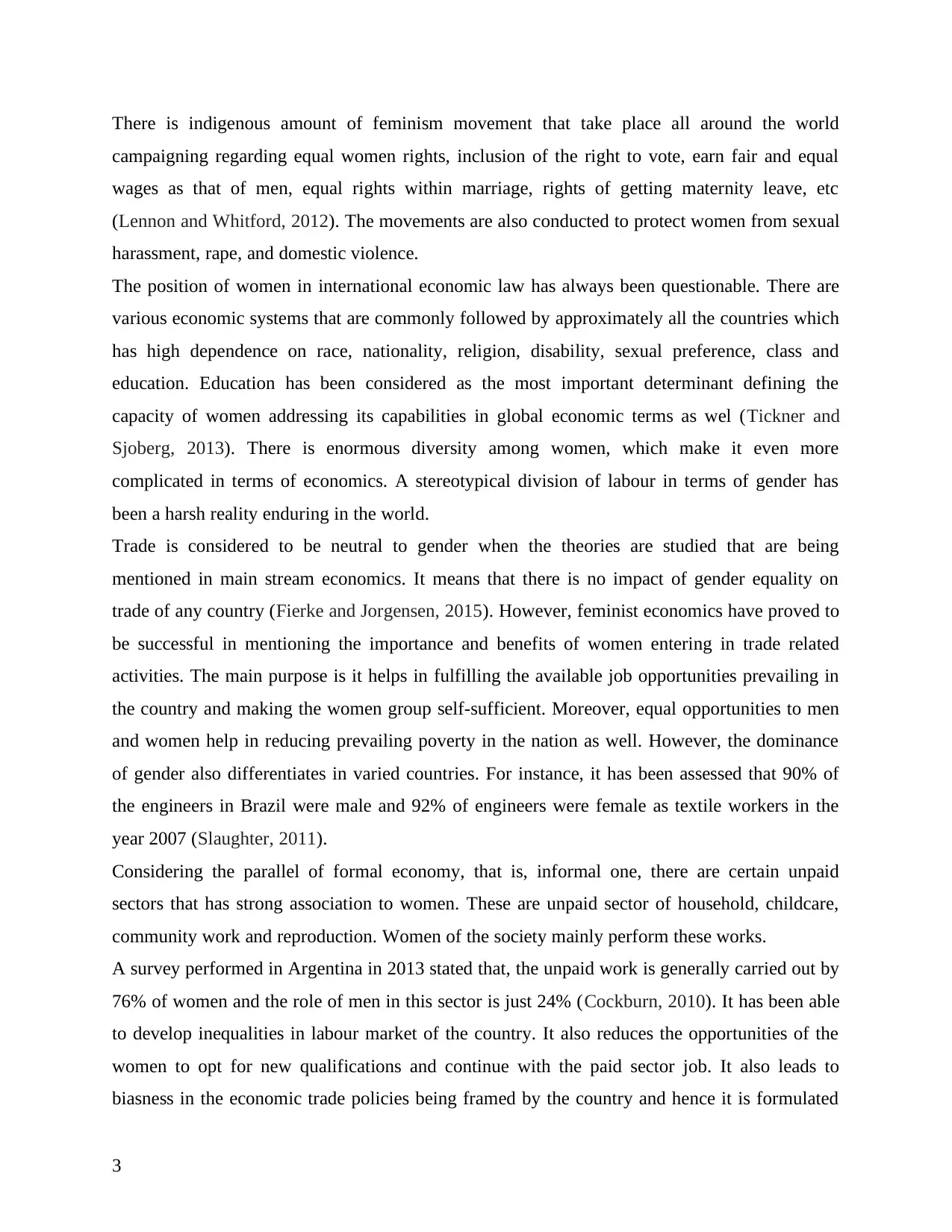
There is indigenous amount of feminism movement that take place all around the world
campaigning regarding equal women rights, inclusion of the right to vote, earn fair and equal
wages as that of men, equal rights within marriage, rights of getting maternity leave, etc
(Lennon and Whitford, 2012). The movements are also conducted to protect women from sexual
harassment, rape, and domestic violence.
The position of women in international economic law has always been questionable. There are
various economic systems that are commonly followed by approximately all the countries which
has high dependence on race, nationality, religion, disability, sexual preference, class and
education. Education has been considered as the most important determinant defining the
capacity of women addressing its capabilities in global economic terms as wel (Tickner and
Sjoberg, 2013). There is enormous diversity among women, which make it even more
complicated in terms of economics. A stereotypical division of labour in terms of gender has
been a harsh reality enduring in the world.
Trade is considered to be neutral to gender when the theories are studied that are being
mentioned in main stream economics. It means that there is no impact of gender equality on
trade of any country (Fierke and Jorgensen, 2015). However, feminist economics have proved to
be successful in mentioning the importance and benefits of women entering in trade related
activities. The main purpose is it helps in fulfilling the available job opportunities prevailing in
the country and making the women group self-sufficient. Moreover, equal opportunities to men
and women help in reducing prevailing poverty in the nation as well. However, the dominance
of gender also differentiates in varied countries. For instance, it has been assessed that 90% of
the engineers in Brazil were male and 92% of engineers were female as textile workers in the
year 2007 (Slaughter, 2011).
Considering the parallel of formal economy, that is, informal one, there are certain unpaid
sectors that has strong association to women. These are unpaid sector of household, childcare,
community work and reproduction. Women of the society mainly perform these works.
A survey performed in Argentina in 2013 stated that, the unpaid work is generally carried out by
76% of women and the role of men in this sector is just 24% (Cockburn, 2010). It has been able
to develop inequalities in labour market of the country. It also reduces the opportunities of the
women to opt for new qualifications and continue with the paid sector job. It also leads to
biasness in the economic trade policies being framed by the country and hence it is formulated
3
campaigning regarding equal women rights, inclusion of the right to vote, earn fair and equal
wages as that of men, equal rights within marriage, rights of getting maternity leave, etc
(Lennon and Whitford, 2012). The movements are also conducted to protect women from sexual
harassment, rape, and domestic violence.
The position of women in international economic law has always been questionable. There are
various economic systems that are commonly followed by approximately all the countries which
has high dependence on race, nationality, religion, disability, sexual preference, class and
education. Education has been considered as the most important determinant defining the
capacity of women addressing its capabilities in global economic terms as wel (Tickner and
Sjoberg, 2013). There is enormous diversity among women, which make it even more
complicated in terms of economics. A stereotypical division of labour in terms of gender has
been a harsh reality enduring in the world.
Trade is considered to be neutral to gender when the theories are studied that are being
mentioned in main stream economics. It means that there is no impact of gender equality on
trade of any country (Fierke and Jorgensen, 2015). However, feminist economics have proved to
be successful in mentioning the importance and benefits of women entering in trade related
activities. The main purpose is it helps in fulfilling the available job opportunities prevailing in
the country and making the women group self-sufficient. Moreover, equal opportunities to men
and women help in reducing prevailing poverty in the nation as well. However, the dominance
of gender also differentiates in varied countries. For instance, it has been assessed that 90% of
the engineers in Brazil were male and 92% of engineers were female as textile workers in the
year 2007 (Slaughter, 2011).
Considering the parallel of formal economy, that is, informal one, there are certain unpaid
sectors that has strong association to women. These are unpaid sector of household, childcare,
community work and reproduction. Women of the society mainly perform these works.
A survey performed in Argentina in 2013 stated that, the unpaid work is generally carried out by
76% of women and the role of men in this sector is just 24% (Cockburn, 2010). It has been able
to develop inequalities in labour market of the country. It also reduces the opportunities of the
women to opt for new qualifications and continue with the paid sector job. It also leads to
biasness in the economic trade policies being framed by the country and hence it is formulated
3
⊘ This is a preview!⊘
Do you want full access?
Subscribe today to unlock all pages.

Trusted by 1+ million students worldwide
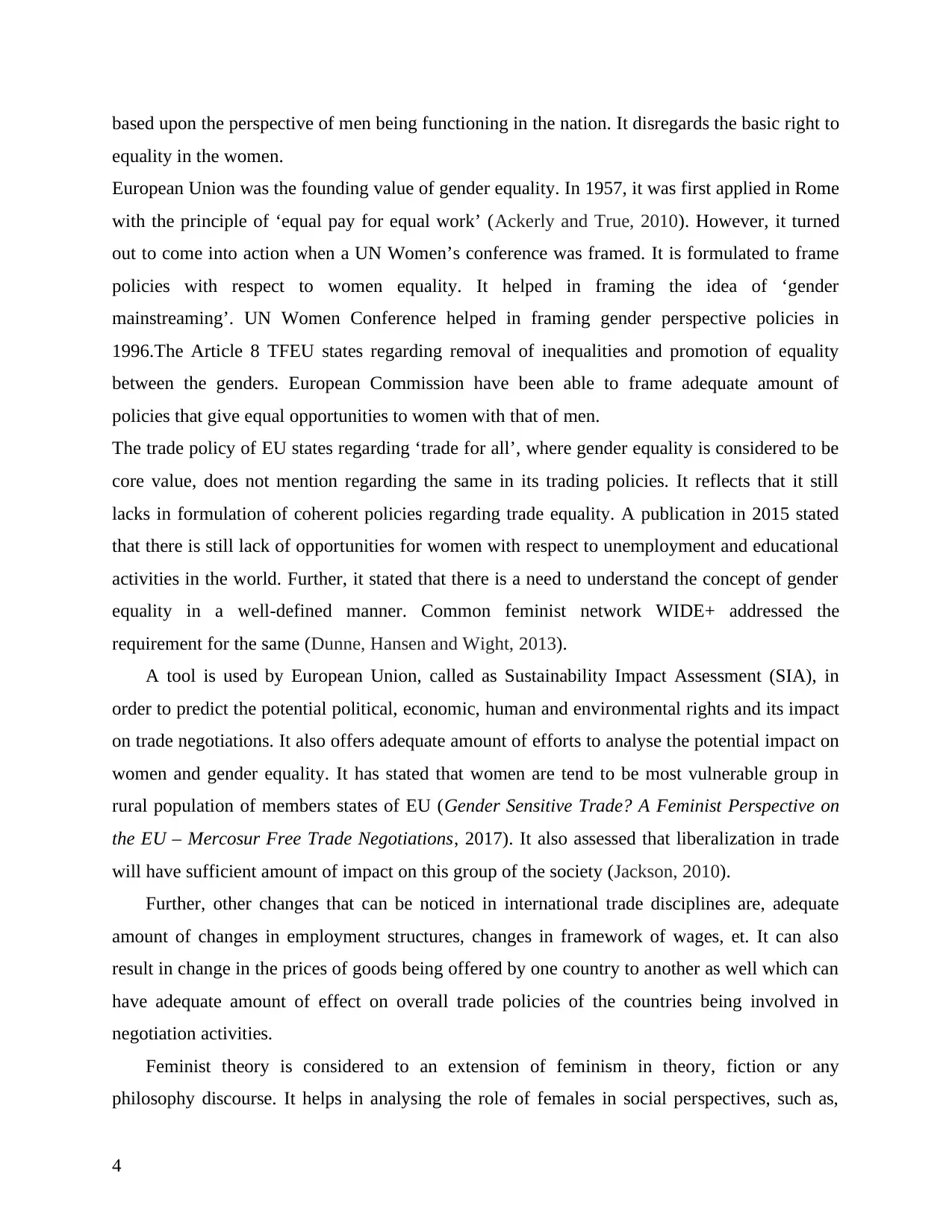
based upon the perspective of men being functioning in the nation. It disregards the basic right to
equality in the women.
European Union was the founding value of gender equality. In 1957, it was first applied in Rome
with the principle of ‘equal pay for equal work’ (Ackerly and True, 2010). However, it turned
out to come into action when a UN Women’s conference was framed. It is formulated to frame
policies with respect to women equality. It helped in framing the idea of ‘gender
mainstreaming’. UN Women Conference helped in framing gender perspective policies in
1996.The Article 8 TFEU states regarding removal of inequalities and promotion of equality
between the genders. European Commission have been able to frame adequate amount of
policies that give equal opportunities to women with that of men.
The trade policy of EU states regarding ‘trade for all’, where gender equality is considered to be
core value, does not mention regarding the same in its trading policies. It reflects that it still
lacks in formulation of coherent policies regarding trade equality. A publication in 2015 stated
that there is still lack of opportunities for women with respect to unemployment and educational
activities in the world. Further, it stated that there is a need to understand the concept of gender
equality in a well-defined manner. Common feminist network WIDE+ addressed the
requirement for the same (Dunne, Hansen and Wight, 2013).
A tool is used by European Union, called as Sustainability Impact Assessment (SIA), in
order to predict the potential political, economic, human and environmental rights and its impact
on trade negotiations. It also offers adequate amount of efforts to analyse the potential impact on
women and gender equality. It has stated that women are tend to be most vulnerable group in
rural population of members states of EU (Gender Sensitive Trade? A Feminist Perspective on
the EU – Mercosur Free Trade Negotiations, 2017). It also assessed that liberalization in trade
will have sufficient amount of impact on this group of the society (Jackson, 2010).
Further, other changes that can be noticed in international trade disciplines are, adequate
amount of changes in employment structures, changes in framework of wages, et. It can also
result in change in the prices of goods being offered by one country to another as well which can
have adequate amount of effect on overall trade policies of the countries being involved in
negotiation activities.
Feminist theory is considered to an extension of feminism in theory, fiction or any
philosophy discourse. It helps in analysing the role of females in social perspectives, such as,
4
equality in the women.
European Union was the founding value of gender equality. In 1957, it was first applied in Rome
with the principle of ‘equal pay for equal work’ (Ackerly and True, 2010). However, it turned
out to come into action when a UN Women’s conference was framed. It is formulated to frame
policies with respect to women equality. It helped in framing the idea of ‘gender
mainstreaming’. UN Women Conference helped in framing gender perspective policies in
1996.The Article 8 TFEU states regarding removal of inequalities and promotion of equality
between the genders. European Commission have been able to frame adequate amount of
policies that give equal opportunities to women with that of men.
The trade policy of EU states regarding ‘trade for all’, where gender equality is considered to be
core value, does not mention regarding the same in its trading policies. It reflects that it still
lacks in formulation of coherent policies regarding trade equality. A publication in 2015 stated
that there is still lack of opportunities for women with respect to unemployment and educational
activities in the world. Further, it stated that there is a need to understand the concept of gender
equality in a well-defined manner. Common feminist network WIDE+ addressed the
requirement for the same (Dunne, Hansen and Wight, 2013).
A tool is used by European Union, called as Sustainability Impact Assessment (SIA), in
order to predict the potential political, economic, human and environmental rights and its impact
on trade negotiations. It also offers adequate amount of efforts to analyse the potential impact on
women and gender equality. It has stated that women are tend to be most vulnerable group in
rural population of members states of EU (Gender Sensitive Trade? A Feminist Perspective on
the EU – Mercosur Free Trade Negotiations, 2017). It also assessed that liberalization in trade
will have sufficient amount of impact on this group of the society (Jackson, 2010).
Further, other changes that can be noticed in international trade disciplines are, adequate
amount of changes in employment structures, changes in framework of wages, et. It can also
result in change in the prices of goods being offered by one country to another as well which can
have adequate amount of effect on overall trade policies of the countries being involved in
negotiation activities.
Feminist theory is considered to an extension of feminism in theory, fiction or any
philosophy discourse. It helps in analysing the role of females in social perspectives, such as,
4
Paraphrase This Document
Need a fresh take? Get an instant paraphrase of this document with our AI Paraphraser
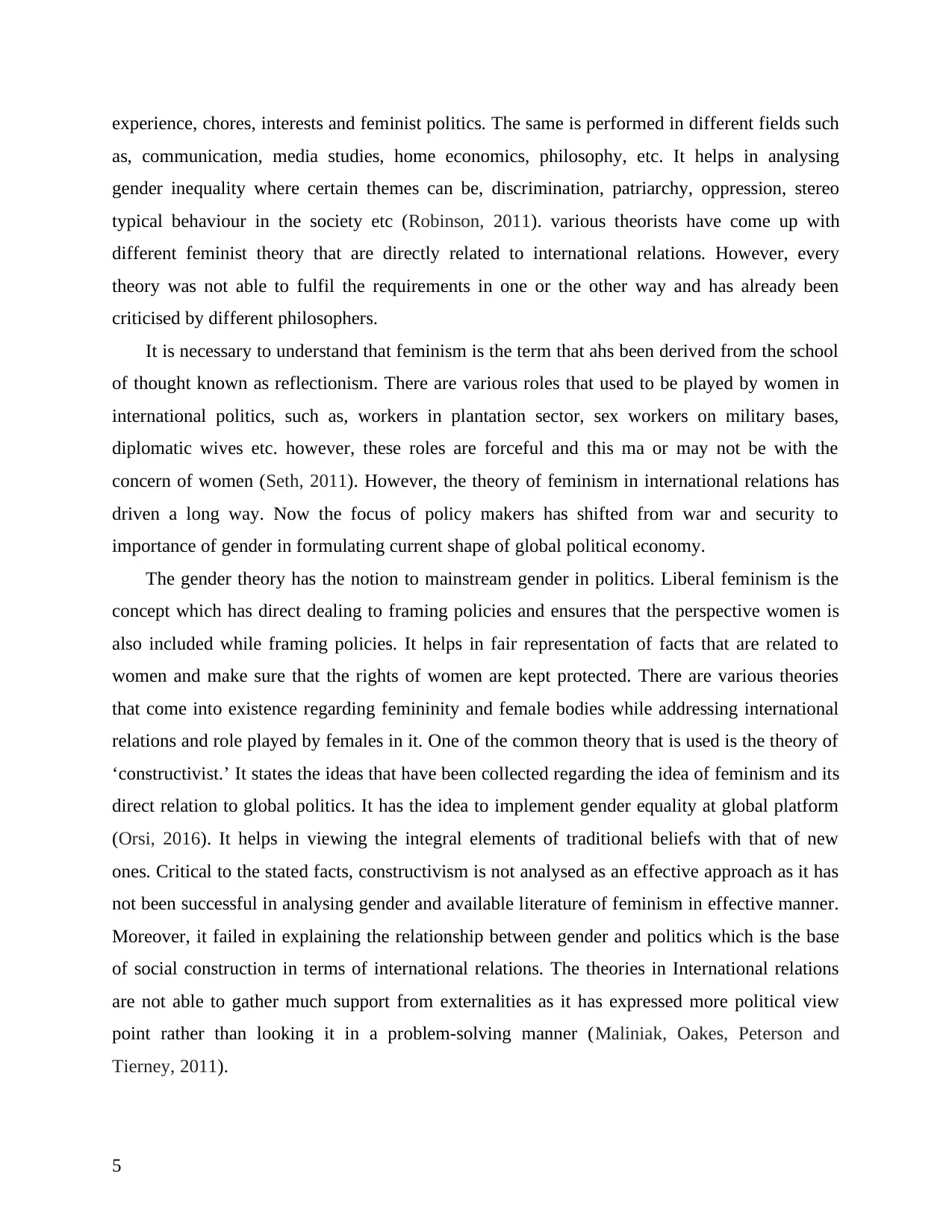
experience, chores, interests and feminist politics. The same is performed in different fields such
as, communication, media studies, home economics, philosophy, etc. It helps in analysing
gender inequality where certain themes can be, discrimination, patriarchy, oppression, stereo
typical behaviour in the society etc (Robinson, 2011). various theorists have come up with
different feminist theory that are directly related to international relations. However, every
theory was not able to fulfil the requirements in one or the other way and has already been
criticised by different philosophers.
It is necessary to understand that feminism is the term that ahs been derived from the school
of thought known as reflectionism. There are various roles that used to be played by women in
international politics, such as, workers in plantation sector, sex workers on military bases,
diplomatic wives etc. however, these roles are forceful and this ma or may not be with the
concern of women (Seth, 2011). However, the theory of feminism in international relations has
driven a long way. Now the focus of policy makers has shifted from war and security to
importance of gender in formulating current shape of global political economy.
The gender theory has the notion to mainstream gender in politics. Liberal feminism is the
concept which has direct dealing to framing policies and ensures that the perspective women is
also included while framing policies. It helps in fair representation of facts that are related to
women and make sure that the rights of women are kept protected. There are various theories
that come into existence regarding femininity and female bodies while addressing international
relations and role played by females in it. One of the common theory that is used is the theory of
‘constructivist.’ It states the ideas that have been collected regarding the idea of feminism and its
direct relation to global politics. It has the idea to implement gender equality at global platform
(Orsi, 2016). It helps in viewing the integral elements of traditional beliefs with that of new
ones. Critical to the stated facts, constructivism is not analysed as an effective approach as it has
not been successful in analysing gender and available literature of feminism in effective manner.
Moreover, it failed in explaining the relationship between gender and politics which is the base
of social construction in terms of international relations. The theories in International relations
are not able to gather much support from externalities as it has expressed more political view
point rather than looking it in a problem-solving manner (Maliniak, Oakes, Peterson and
Tierney, 2011).
5
as, communication, media studies, home economics, philosophy, etc. It helps in analysing
gender inequality where certain themes can be, discrimination, patriarchy, oppression, stereo
typical behaviour in the society etc (Robinson, 2011). various theorists have come up with
different feminist theory that are directly related to international relations. However, every
theory was not able to fulfil the requirements in one or the other way and has already been
criticised by different philosophers.
It is necessary to understand that feminism is the term that ahs been derived from the school
of thought known as reflectionism. There are various roles that used to be played by women in
international politics, such as, workers in plantation sector, sex workers on military bases,
diplomatic wives etc. however, these roles are forceful and this ma or may not be with the
concern of women (Seth, 2011). However, the theory of feminism in international relations has
driven a long way. Now the focus of policy makers has shifted from war and security to
importance of gender in formulating current shape of global political economy.
The gender theory has the notion to mainstream gender in politics. Liberal feminism is the
concept which has direct dealing to framing policies and ensures that the perspective women is
also included while framing policies. It helps in fair representation of facts that are related to
women and make sure that the rights of women are kept protected. There are various theories
that come into existence regarding femininity and female bodies while addressing international
relations and role played by females in it. One of the common theory that is used is the theory of
‘constructivist.’ It states the ideas that have been collected regarding the idea of feminism and its
direct relation to global politics. It has the idea to implement gender equality at global platform
(Orsi, 2016). It helps in viewing the integral elements of traditional beliefs with that of new
ones. Critical to the stated facts, constructivism is not analysed as an effective approach as it has
not been successful in analysing gender and available literature of feminism in effective manner.
Moreover, it failed in explaining the relationship between gender and politics which is the base
of social construction in terms of international relations. The theories in International relations
are not able to gather much support from externalities as it has expressed more political view
point rather than looking it in a problem-solving manner (Maliniak, Oakes, Peterson and
Tierney, 2011).
5
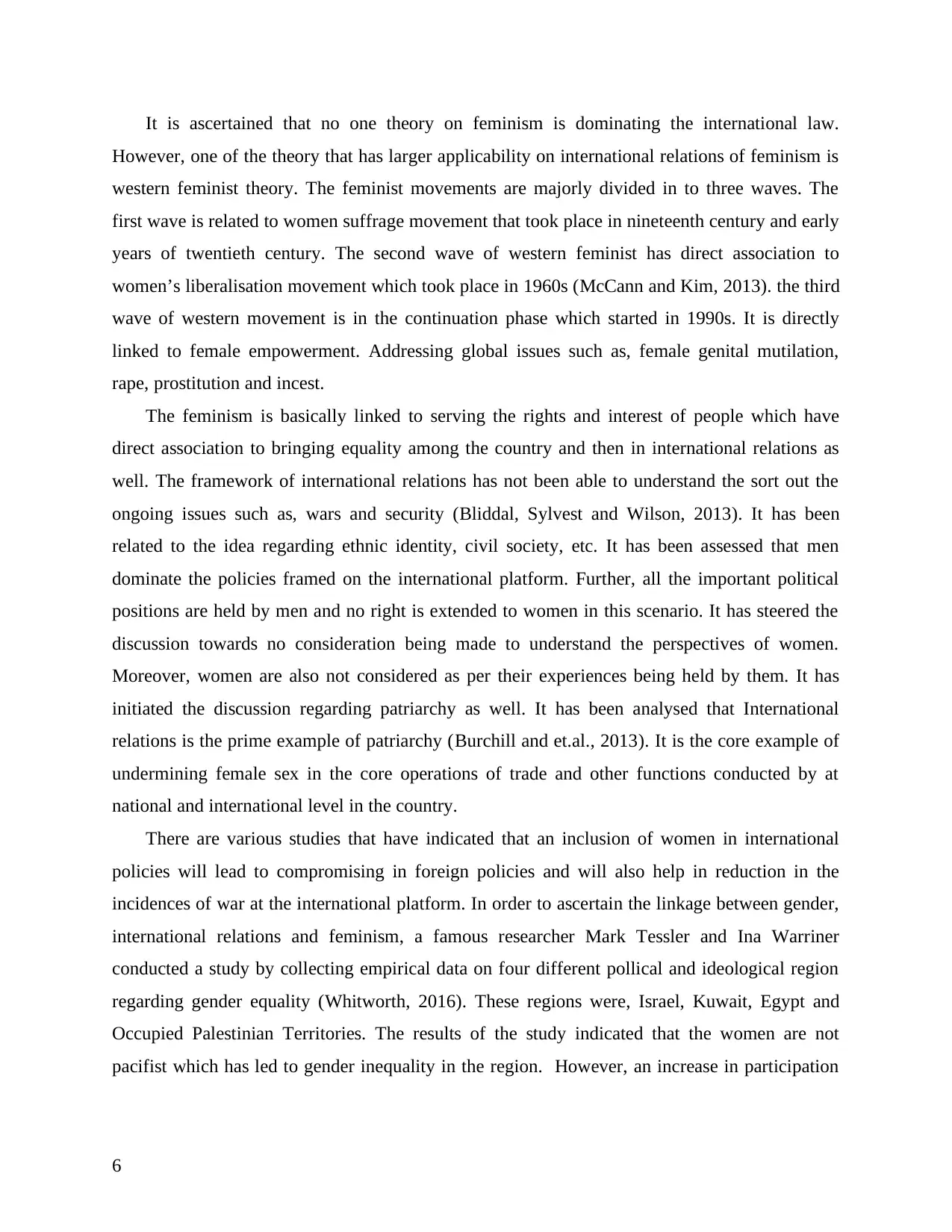
It is ascertained that no one theory on feminism is dominating the international law.
However, one of the theory that has larger applicability on international relations of feminism is
western feminist theory. The feminist movements are majorly divided in to three waves. The
first wave is related to women suffrage movement that took place in nineteenth century and early
years of twentieth century. The second wave of western feminist has direct association to
women’s liberalisation movement which took place in 1960s (McCann and Kim, 2013). the third
wave of western movement is in the continuation phase which started in 1990s. It is directly
linked to female empowerment. Addressing global issues such as, female genital mutilation,
rape, prostitution and incest.
The feminism is basically linked to serving the rights and interest of people which have
direct association to bringing equality among the country and then in international relations as
well. The framework of international relations has not been able to understand the sort out the
ongoing issues such as, wars and security (Bliddal, Sylvest and Wilson, 2013). It has been
related to the idea regarding ethnic identity, civil society, etc. It has been assessed that men
dominate the policies framed on the international platform. Further, all the important political
positions are held by men and no right is extended to women in this scenario. It has steered the
discussion towards no consideration being made to understand the perspectives of women.
Moreover, women are also not considered as per their experiences being held by them. It has
initiated the discussion regarding patriarchy as well. It has been analysed that International
relations is the prime example of patriarchy (Burchill and et.al., 2013). It is the core example of
undermining female sex in the core operations of trade and other functions conducted by at
national and international level in the country.
There are various studies that have indicated that an inclusion of women in international
policies will lead to compromising in foreign policies and will also help in reduction in the
incidences of war at the international platform. In order to ascertain the linkage between gender,
international relations and feminism, a famous researcher Mark Tessler and Ina Warriner
conducted a study by collecting empirical data on four different pollical and ideological region
regarding gender equality (Whitworth, 2016). These regions were, Israel, Kuwait, Egypt and
Occupied Palestinian Territories. The results of the study indicated that the women are not
pacifist which has led to gender inequality in the region. However, an increase in participation
6
However, one of the theory that has larger applicability on international relations of feminism is
western feminist theory. The feminist movements are majorly divided in to three waves. The
first wave is related to women suffrage movement that took place in nineteenth century and early
years of twentieth century. The second wave of western feminist has direct association to
women’s liberalisation movement which took place in 1960s (McCann and Kim, 2013). the third
wave of western movement is in the continuation phase which started in 1990s. It is directly
linked to female empowerment. Addressing global issues such as, female genital mutilation,
rape, prostitution and incest.
The feminism is basically linked to serving the rights and interest of people which have
direct association to bringing equality among the country and then in international relations as
well. The framework of international relations has not been able to understand the sort out the
ongoing issues such as, wars and security (Bliddal, Sylvest and Wilson, 2013). It has been
related to the idea regarding ethnic identity, civil society, etc. It has been assessed that men
dominate the policies framed on the international platform. Further, all the important political
positions are held by men and no right is extended to women in this scenario. It has steered the
discussion towards no consideration being made to understand the perspectives of women.
Moreover, women are also not considered as per their experiences being held by them. It has
initiated the discussion regarding patriarchy as well. It has been analysed that International
relations is the prime example of patriarchy (Burchill and et.al., 2013). It is the core example of
undermining female sex in the core operations of trade and other functions conducted by at
national and international level in the country.
There are various studies that have indicated that an inclusion of women in international
policies will lead to compromising in foreign policies and will also help in reduction in the
incidences of war at the international platform. In order to ascertain the linkage between gender,
international relations and feminism, a famous researcher Mark Tessler and Ina Warriner
conducted a study by collecting empirical data on four different pollical and ideological region
regarding gender equality (Whitworth, 2016). These regions were, Israel, Kuwait, Egypt and
Occupied Palestinian Territories. The results of the study indicated that the women are not
pacifist which has led to gender inequality in the region. However, an increase in participation
6
⊘ This is a preview!⊘
Do you want full access?
Subscribe today to unlock all pages.

Trusted by 1+ million students worldwide
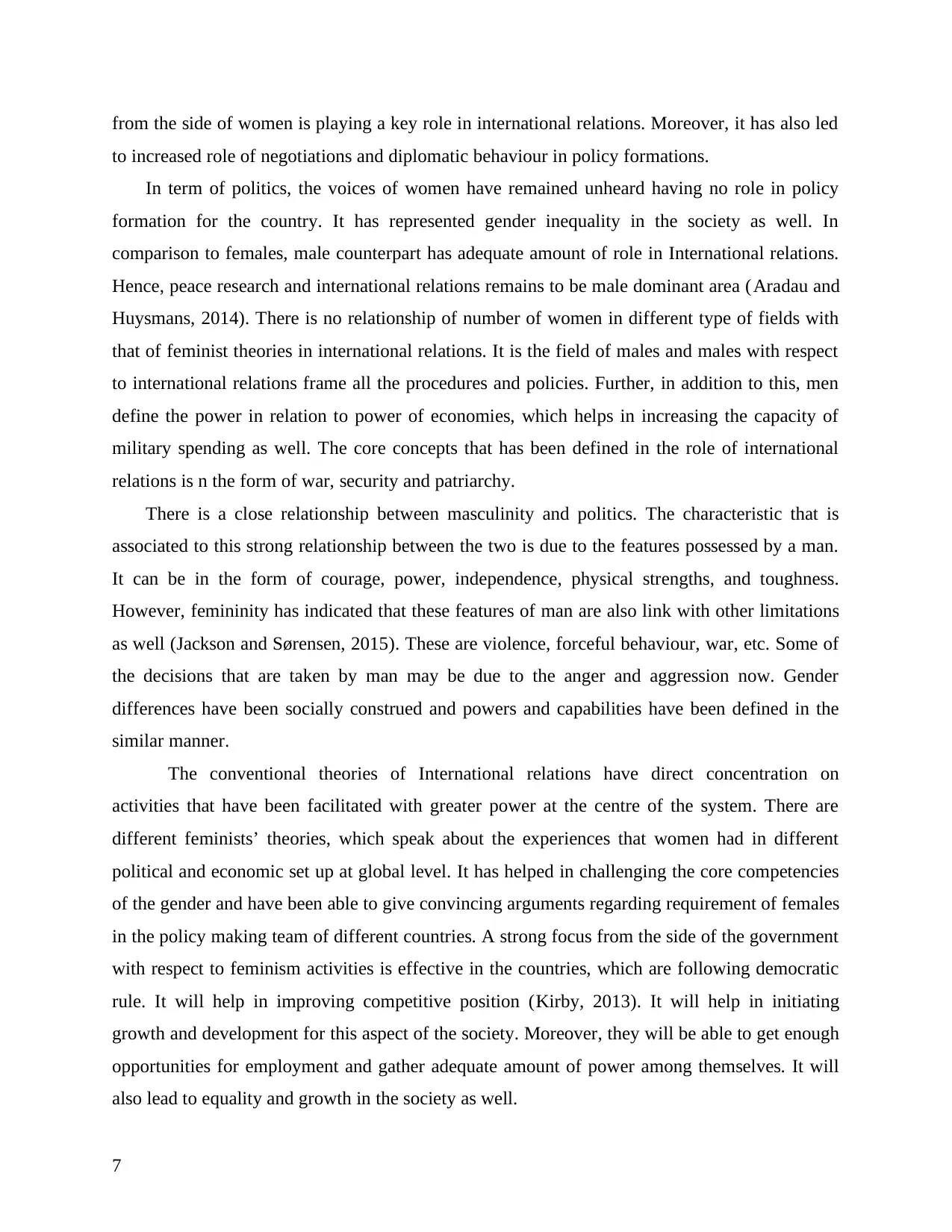
from the side of women is playing a key role in international relations. Moreover, it has also led
to increased role of negotiations and diplomatic behaviour in policy formations.
In term of politics, the voices of women have remained unheard having no role in policy
formation for the country. It has represented gender inequality in the society as well. In
comparison to females, male counterpart has adequate amount of role in International relations.
Hence, peace research and international relations remains to be male dominant area (Aradau and
Huysmans, 2014). There is no relationship of number of women in different type of fields with
that of feminist theories in international relations. It is the field of males and males with respect
to international relations frame all the procedures and policies. Further, in addition to this, men
define the power in relation to power of economies, which helps in increasing the capacity of
military spending as well. The core concepts that has been defined in the role of international
relations is n the form of war, security and patriarchy.
There is a close relationship between masculinity and politics. The characteristic that is
associated to this strong relationship between the two is due to the features possessed by a man.
It can be in the form of courage, power, independence, physical strengths, and toughness.
However, femininity has indicated that these features of man are also link with other limitations
as well (Jackson and Sørensen, 2015). These are violence, forceful behaviour, war, etc. Some of
the decisions that are taken by man may be due to the anger and aggression now. Gender
differences have been socially construed and powers and capabilities have been defined in the
similar manner.
The conventional theories of International relations have direct concentration on
activities that have been facilitated with greater power at the centre of the system. There are
different feminists’ theories, which speak about the experiences that women had in different
political and economic set up at global level. It has helped in challenging the core competencies
of the gender and have been able to give convincing arguments regarding requirement of females
in the policy making team of different countries. A strong focus from the side of the government
with respect to feminism activities is effective in the countries, which are following democratic
rule. It will help in improving competitive position (Kirby, 2013). It will help in initiating
growth and development for this aspect of the society. Moreover, they will be able to get enough
opportunities for employment and gather adequate amount of power among themselves. It will
also lead to equality and growth in the society as well.
7
to increased role of negotiations and diplomatic behaviour in policy formations.
In term of politics, the voices of women have remained unheard having no role in policy
formation for the country. It has represented gender inequality in the society as well. In
comparison to females, male counterpart has adequate amount of role in International relations.
Hence, peace research and international relations remains to be male dominant area (Aradau and
Huysmans, 2014). There is no relationship of number of women in different type of fields with
that of feminist theories in international relations. It is the field of males and males with respect
to international relations frame all the procedures and policies. Further, in addition to this, men
define the power in relation to power of economies, which helps in increasing the capacity of
military spending as well. The core concepts that has been defined in the role of international
relations is n the form of war, security and patriarchy.
There is a close relationship between masculinity and politics. The characteristic that is
associated to this strong relationship between the two is due to the features possessed by a man.
It can be in the form of courage, power, independence, physical strengths, and toughness.
However, femininity has indicated that these features of man are also link with other limitations
as well (Jackson and Sørensen, 2015). These are violence, forceful behaviour, war, etc. Some of
the decisions that are taken by man may be due to the anger and aggression now. Gender
differences have been socially construed and powers and capabilities have been defined in the
similar manner.
The conventional theories of International relations have direct concentration on
activities that have been facilitated with greater power at the centre of the system. There are
different feminists’ theories, which speak about the experiences that women had in different
political and economic set up at global level. It has helped in challenging the core competencies
of the gender and have been able to give convincing arguments regarding requirement of females
in the policy making team of different countries. A strong focus from the side of the government
with respect to feminism activities is effective in the countries, which are following democratic
rule. It will help in improving competitive position (Kirby, 2013). It will help in initiating
growth and development for this aspect of the society. Moreover, they will be able to get enough
opportunities for employment and gather adequate amount of power among themselves. It will
also lead to equality and growth in the society as well.
7
Paraphrase This Document
Need a fresh take? Get an instant paraphrase of this document with our AI Paraphraser
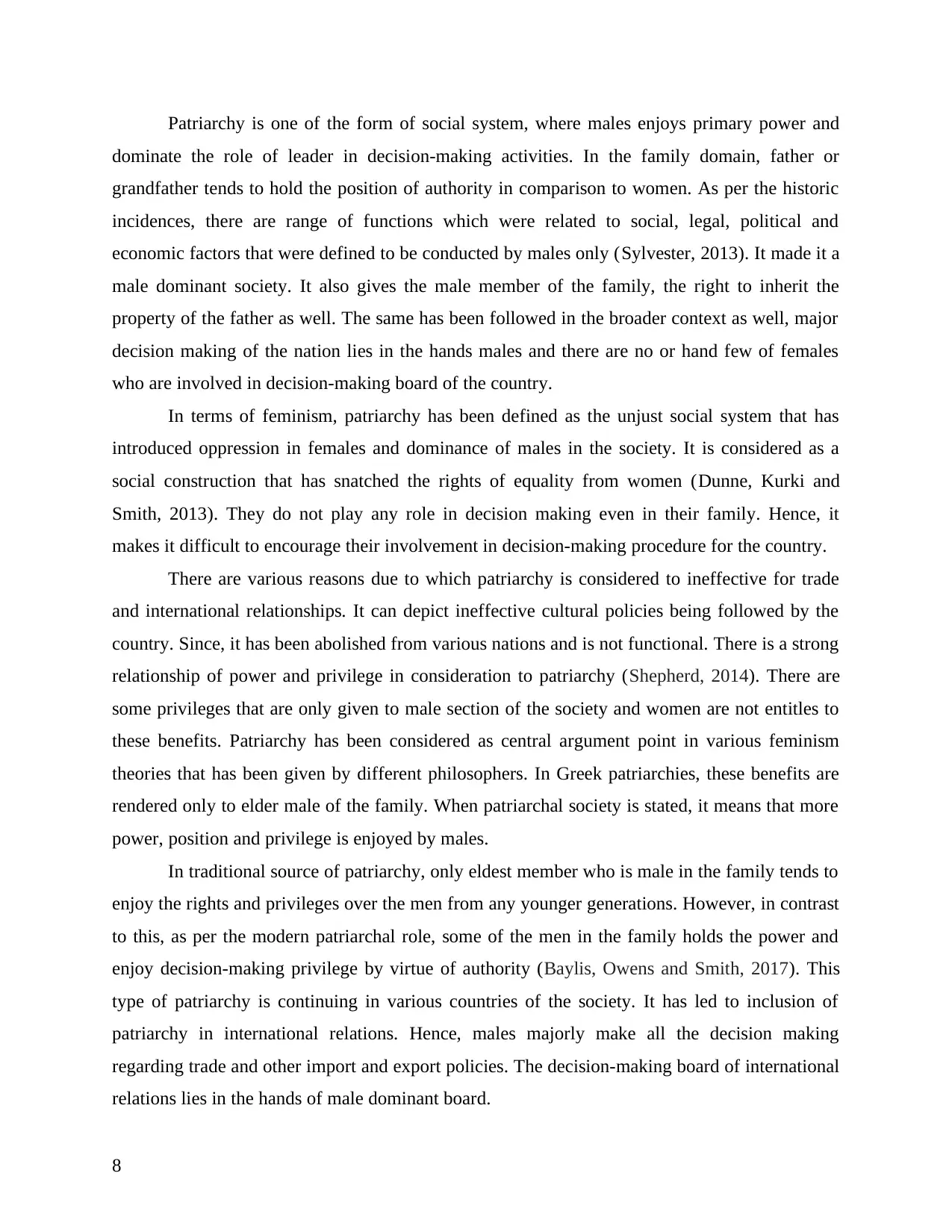
Patriarchy is one of the form of social system, where males enjoys primary power and
dominate the role of leader in decision-making activities. In the family domain, father or
grandfather tends to hold the position of authority in comparison to women. As per the historic
incidences, there are range of functions which were related to social, legal, political and
economic factors that were defined to be conducted by males only (Sylvester, 2013). It made it a
male dominant society. It also gives the male member of the family, the right to inherit the
property of the father as well. The same has been followed in the broader context as well, major
decision making of the nation lies in the hands males and there are no or hand few of females
who are involved in decision-making board of the country.
In terms of feminism, patriarchy has been defined as the unjust social system that has
introduced oppression in females and dominance of males in the society. It is considered as a
social construction that has snatched the rights of equality from women (Dunne, Kurki and
Smith, 2013). They do not play any role in decision making even in their family. Hence, it
makes it difficult to encourage their involvement in decision-making procedure for the country.
There are various reasons due to which patriarchy is considered to ineffective for trade
and international relationships. It can depict ineffective cultural policies being followed by the
country. Since, it has been abolished from various nations and is not functional. There is a strong
relationship of power and privilege in consideration to patriarchy (Shepherd, 2014). There are
some privileges that are only given to male section of the society and women are not entitles to
these benefits. Patriarchy has been considered as central argument point in various feminism
theories that has been given by different philosophers. In Greek patriarchies, these benefits are
rendered only to elder male of the family. When patriarchal society is stated, it means that more
power, position and privilege is enjoyed by males.
In traditional source of patriarchy, only eldest member who is male in the family tends to
enjoy the rights and privileges over the men from any younger generations. However, in contrast
to this, as per the modern patriarchal role, some of the men in the family holds the power and
enjoy decision-making privilege by virtue of authority (Baylis, Owens and Smith, 2017). This
type of patriarchy is continuing in various countries of the society. It has led to inclusion of
patriarchy in international relations. Hence, males majorly make all the decision making
regarding trade and other import and export policies. The decision-making board of international
relations lies in the hands of male dominant board.
8
dominate the role of leader in decision-making activities. In the family domain, father or
grandfather tends to hold the position of authority in comparison to women. As per the historic
incidences, there are range of functions which were related to social, legal, political and
economic factors that were defined to be conducted by males only (Sylvester, 2013). It made it a
male dominant society. It also gives the male member of the family, the right to inherit the
property of the father as well. The same has been followed in the broader context as well, major
decision making of the nation lies in the hands males and there are no or hand few of females
who are involved in decision-making board of the country.
In terms of feminism, patriarchy has been defined as the unjust social system that has
introduced oppression in females and dominance of males in the society. It is considered as a
social construction that has snatched the rights of equality from women (Dunne, Kurki and
Smith, 2013). They do not play any role in decision making even in their family. Hence, it
makes it difficult to encourage their involvement in decision-making procedure for the country.
There are various reasons due to which patriarchy is considered to ineffective for trade
and international relationships. It can depict ineffective cultural policies being followed by the
country. Since, it has been abolished from various nations and is not functional. There is a strong
relationship of power and privilege in consideration to patriarchy (Shepherd, 2014). There are
some privileges that are only given to male section of the society and women are not entitles to
these benefits. Patriarchy has been considered as central argument point in various feminism
theories that has been given by different philosophers. In Greek patriarchies, these benefits are
rendered only to elder male of the family. When patriarchal society is stated, it means that more
power, position and privilege is enjoyed by males.
In traditional source of patriarchy, only eldest member who is male in the family tends to
enjoy the rights and privileges over the men from any younger generations. However, in contrast
to this, as per the modern patriarchal role, some of the men in the family holds the power and
enjoy decision-making privilege by virtue of authority (Baylis, Owens and Smith, 2017). This
type of patriarchy is continuing in various countries of the society. It has led to inclusion of
patriarchy in international relations. Hence, males majorly make all the decision making
regarding trade and other import and export policies. The decision-making board of international
relations lies in the hands of male dominant board.
8
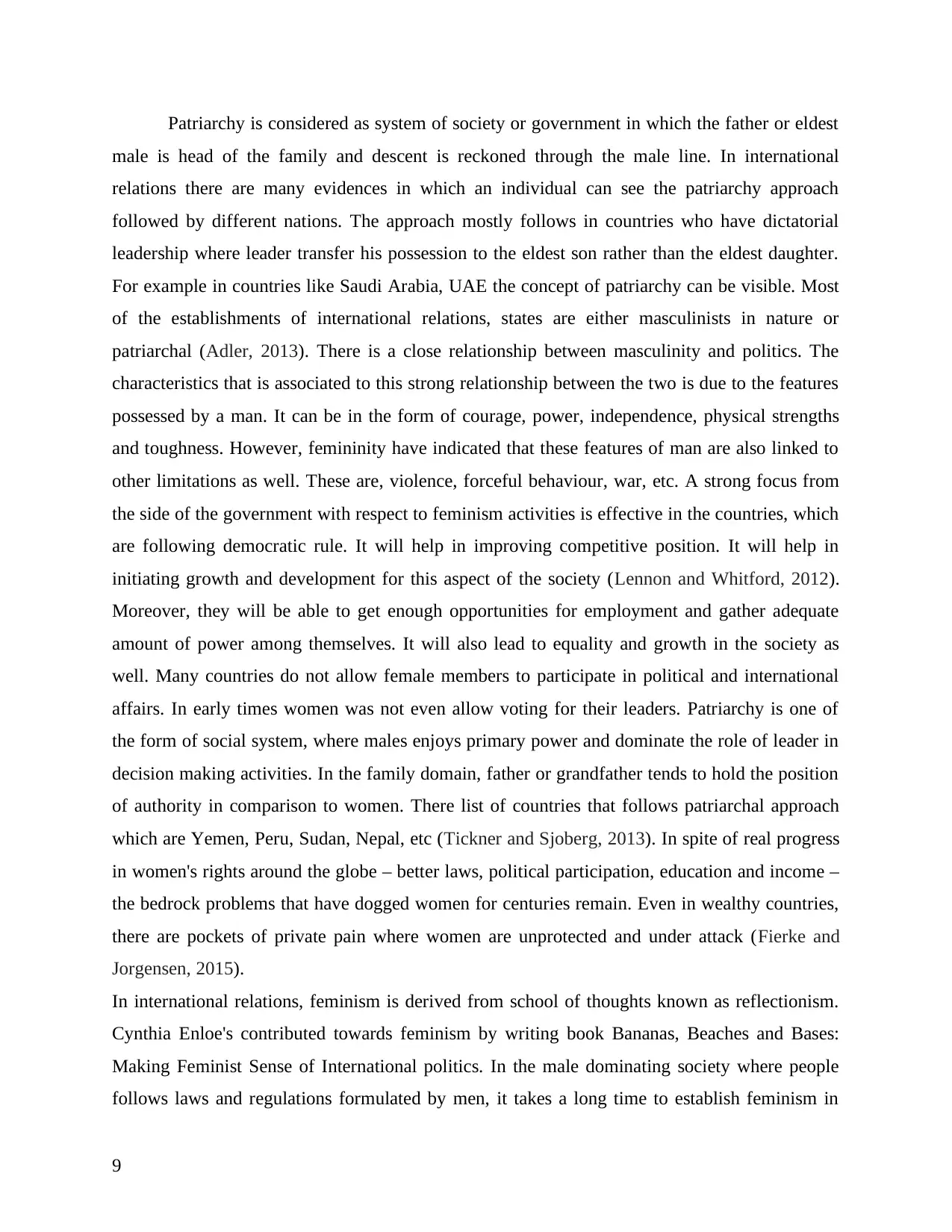
Patriarchy is considered as system of society or government in which the father or eldest
male is head of the family and descent is reckoned through the male line. In international
relations there are many evidences in which an individual can see the patriarchy approach
followed by different nations. The approach mostly follows in countries who have dictatorial
leadership where leader transfer his possession to the eldest son rather than the eldest daughter.
For example in countries like Saudi Arabia, UAE the concept of patriarchy can be visible. Most
of the establishments of international relations, states are either masculinists in nature or
patriarchal (Adler, 2013). There is a close relationship between masculinity and politics. The
characteristics that is associated to this strong relationship between the two is due to the features
possessed by a man. It can be in the form of courage, power, independence, physical strengths
and toughness. However, femininity have indicated that these features of man are also linked to
other limitations as well. These are, violence, forceful behaviour, war, etc. A strong focus from
the side of the government with respect to feminism activities is effective in the countries, which
are following democratic rule. It will help in improving competitive position. It will help in
initiating growth and development for this aspect of the society (Lennon and Whitford, 2012).
Moreover, they will be able to get enough opportunities for employment and gather adequate
amount of power among themselves. It will also lead to equality and growth in the society as
well. Many countries do not allow female members to participate in political and international
affairs. In early times women was not even allow voting for their leaders. Patriarchy is one of
the form of social system, where males enjoys primary power and dominate the role of leader in
decision making activities. In the family domain, father or grandfather tends to hold the position
of authority in comparison to women. There list of countries that follows patriarchal approach
which are Yemen, Peru, Sudan, Nepal, etc (Tickner and Sjoberg, 2013). In spite of real progress
in women's rights around the globe – better laws, political participation, education and income –
the bedrock problems that have dogged women for centuries remain. Even in wealthy countries,
there are pockets of private pain where women are unprotected and under attack (Fierke and
Jorgensen, 2015).
In international relations, feminism is derived from school of thoughts known as reflectionism.
Cynthia Enloe's contributed towards feminism by writing book Bananas, Beaches and Bases:
Making Feminist Sense of International politics. In the male dominating society where people
follows laws and regulations formulated by men, it takes a long time to establish feminism in
9
male is head of the family and descent is reckoned through the male line. In international
relations there are many evidences in which an individual can see the patriarchy approach
followed by different nations. The approach mostly follows in countries who have dictatorial
leadership where leader transfer his possession to the eldest son rather than the eldest daughter.
For example in countries like Saudi Arabia, UAE the concept of patriarchy can be visible. Most
of the establishments of international relations, states are either masculinists in nature or
patriarchal (Adler, 2013). There is a close relationship between masculinity and politics. The
characteristics that is associated to this strong relationship between the two is due to the features
possessed by a man. It can be in the form of courage, power, independence, physical strengths
and toughness. However, femininity have indicated that these features of man are also linked to
other limitations as well. These are, violence, forceful behaviour, war, etc. A strong focus from
the side of the government with respect to feminism activities is effective in the countries, which
are following democratic rule. It will help in improving competitive position. It will help in
initiating growth and development for this aspect of the society (Lennon and Whitford, 2012).
Moreover, they will be able to get enough opportunities for employment and gather adequate
amount of power among themselves. It will also lead to equality and growth in the society as
well. Many countries do not allow female members to participate in political and international
affairs. In early times women was not even allow voting for their leaders. Patriarchy is one of
the form of social system, where males enjoys primary power and dominate the role of leader in
decision making activities. In the family domain, father or grandfather tends to hold the position
of authority in comparison to women. There list of countries that follows patriarchal approach
which are Yemen, Peru, Sudan, Nepal, etc (Tickner and Sjoberg, 2013). In spite of real progress
in women's rights around the globe – better laws, political participation, education and income –
the bedrock problems that have dogged women for centuries remain. Even in wealthy countries,
there are pockets of private pain where women are unprotected and under attack (Fierke and
Jorgensen, 2015).
In international relations, feminism is derived from school of thoughts known as reflectionism.
Cynthia Enloe's contributed towards feminism by writing book Bananas, Beaches and Bases:
Making Feminist Sense of International politics. In the male dominating society where people
follows laws and regulations formulated by men, it takes a long time to establish feminism in
9
⊘ This is a preview!⊘
Do you want full access?
Subscribe today to unlock all pages.

Trusted by 1+ million students worldwide
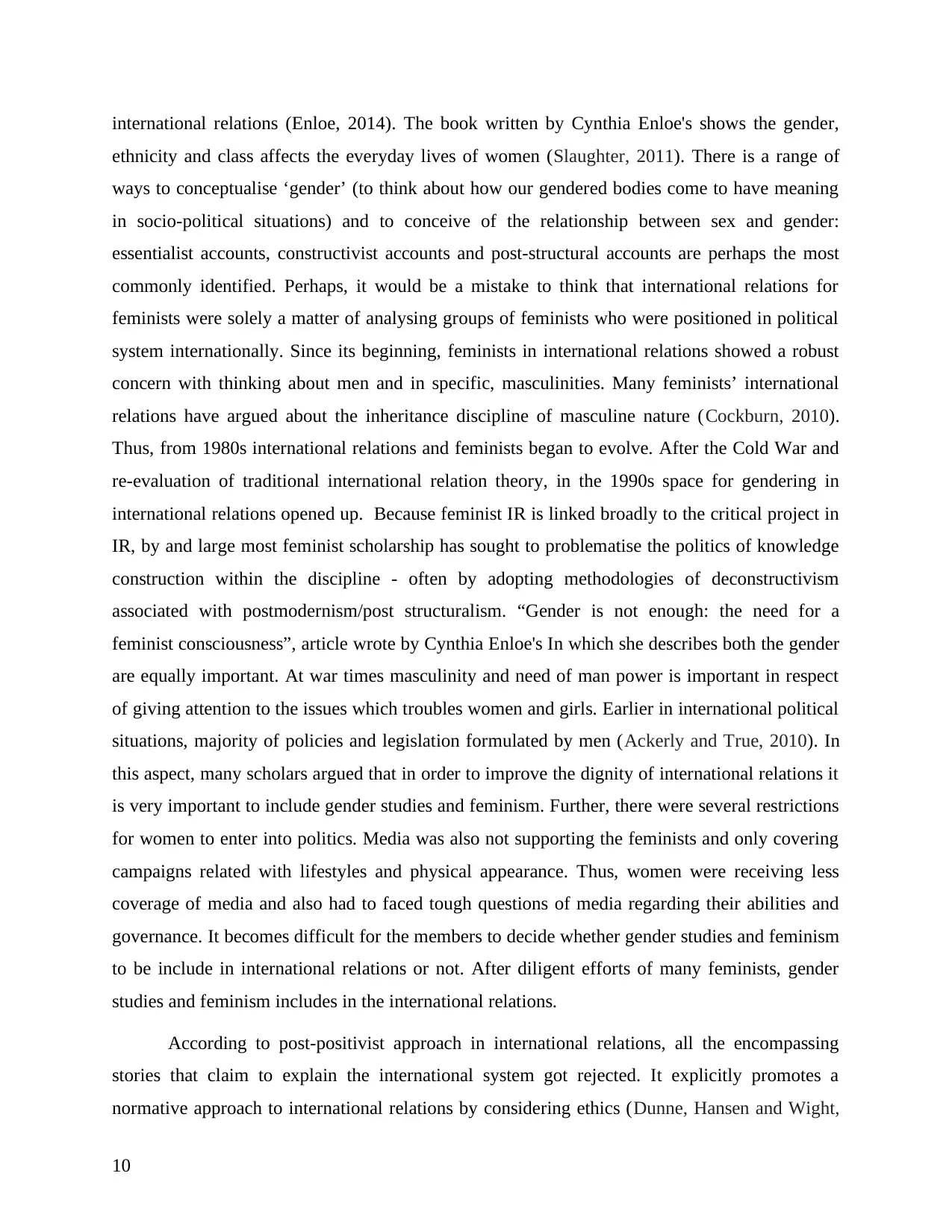
international relations (Enloe, 2014). The book written by Cynthia Enloe's shows the gender,
ethnicity and class affects the everyday lives of women (Slaughter, 2011). There is a range of
ways to conceptualise ‘gender’ (to think about how our gendered bodies come to have meaning
in socio-political situations) and to conceive of the relationship between sex and gender:
essentialist accounts, constructivist accounts and post-structural accounts are perhaps the most
commonly identified. Perhaps, it would be a mistake to think that international relations for
feminists were solely a matter of analysing groups of feminists who were positioned in political
system internationally. Since its beginning, feminists in international relations showed a robust
concern with thinking about men and in specific, masculinities. Many feminists’ international
relations have argued about the inheritance discipline of masculine nature (Cockburn, 2010).
Thus, from 1980s international relations and feminists began to evolve. After the Cold War and
re-evaluation of traditional international relation theory, in the 1990s space for gendering in
international relations opened up. Because feminist IR is linked broadly to the critical project in
IR, by and large most feminist scholarship has sought to problematise the politics of knowledge
construction within the discipline - often by adopting methodologies of deconstructivism
associated with postmodernism/post structuralism. “Gender is not enough: the need for a
feminist consciousness”, article wrote by Cynthia Enloe's In which she describes both the gender
are equally important. At war times masculinity and need of man power is important in respect
of giving attention to the issues which troubles women and girls. Earlier in international political
situations, majority of policies and legislation formulated by men (Ackerly and True, 2010). In
this aspect, many scholars argued that in order to improve the dignity of international relations it
is very important to include gender studies and feminism. Further, there were several restrictions
for women to enter into politics. Media was also not supporting the feminists and only covering
campaigns related with lifestyles and physical appearance. Thus, women were receiving less
coverage of media and also had to faced tough questions of media regarding their abilities and
governance. It becomes difficult for the members to decide whether gender studies and feminism
to be include in international relations or not. After diligent efforts of many feminists, gender
studies and feminism includes in the international relations.
According to post-positivist approach in international relations, all the encompassing
stories that claim to explain the international system got rejected. It explicitly promotes a
normative approach to international relations by considering ethics (Dunne, Hansen and Wight,
10
ethnicity and class affects the everyday lives of women (Slaughter, 2011). There is a range of
ways to conceptualise ‘gender’ (to think about how our gendered bodies come to have meaning
in socio-political situations) and to conceive of the relationship between sex and gender:
essentialist accounts, constructivist accounts and post-structural accounts are perhaps the most
commonly identified. Perhaps, it would be a mistake to think that international relations for
feminists were solely a matter of analysing groups of feminists who were positioned in political
system internationally. Since its beginning, feminists in international relations showed a robust
concern with thinking about men and in specific, masculinities. Many feminists’ international
relations have argued about the inheritance discipline of masculine nature (Cockburn, 2010).
Thus, from 1980s international relations and feminists began to evolve. After the Cold War and
re-evaluation of traditional international relation theory, in the 1990s space for gendering in
international relations opened up. Because feminist IR is linked broadly to the critical project in
IR, by and large most feminist scholarship has sought to problematise the politics of knowledge
construction within the discipline - often by adopting methodologies of deconstructivism
associated with postmodernism/post structuralism. “Gender is not enough: the need for a
feminist consciousness”, article wrote by Cynthia Enloe's In which she describes both the gender
are equally important. At war times masculinity and need of man power is important in respect
of giving attention to the issues which troubles women and girls. Earlier in international political
situations, majority of policies and legislation formulated by men (Ackerly and True, 2010). In
this aspect, many scholars argued that in order to improve the dignity of international relations it
is very important to include gender studies and feminism. Further, there were several restrictions
for women to enter into politics. Media was also not supporting the feminists and only covering
campaigns related with lifestyles and physical appearance. Thus, women were receiving less
coverage of media and also had to faced tough questions of media regarding their abilities and
governance. It becomes difficult for the members to decide whether gender studies and feminism
to be include in international relations or not. After diligent efforts of many feminists, gender
studies and feminism includes in the international relations.
According to post-positivist approach in international relations, all the encompassing
stories that claim to explain the international system got rejected. It explicitly promotes a
normative approach to international relations by considering ethics (Dunne, Hansen and Wight,
10
Paraphrase This Document
Need a fresh take? Get an instant paraphrase of this document with our AI Paraphraser
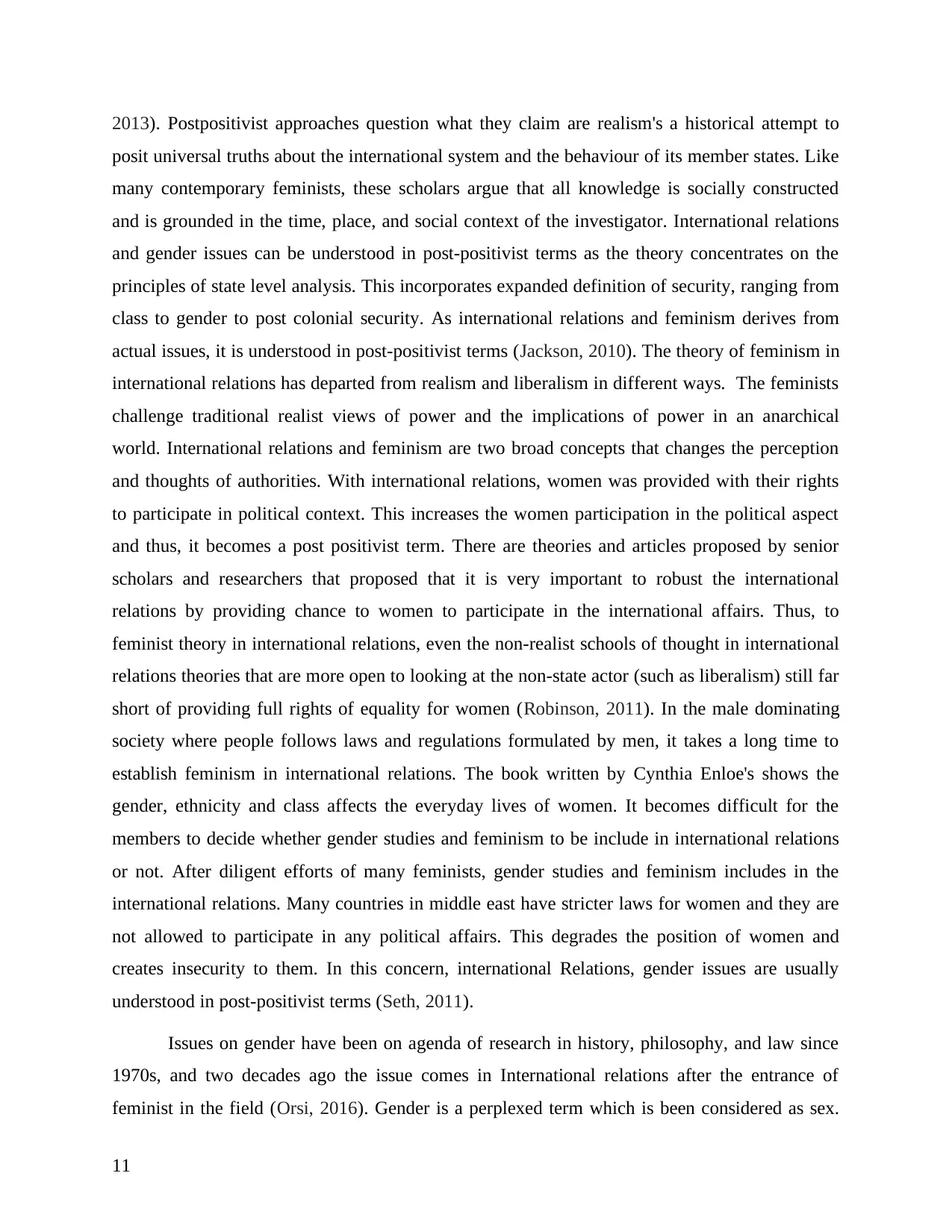
2013). Postpositivist approaches question what they claim are realism's a historical attempt to
posit universal truths about the international system and the behaviour of its member states. Like
many contemporary feminists, these scholars argue that all knowledge is socially constructed
and is grounded in the time, place, and social context of the investigator. International relations
and gender issues can be understood in post-positivist terms as the theory concentrates on the
principles of state level analysis. This incorporates expanded definition of security, ranging from
class to gender to post colonial security. As international relations and feminism derives from
actual issues, it is understood in post-positivist terms (Jackson, 2010). The theory of feminism in
international relations has departed from realism and liberalism in different ways. The feminists
challenge traditional realist views of power and the implications of power in an anarchical
world. International relations and feminism are two broad concepts that changes the perception
and thoughts of authorities. With international relations, women was provided with their rights
to participate in political context. This increases the women participation in the political aspect
and thus, it becomes a post positivist term. There are theories and articles proposed by senior
scholars and researchers that proposed that it is very important to robust the international
relations by providing chance to women to participate in the international affairs. Thus, to
feminist theory in international relations, even the non-realist schools of thought in international
relations theories that are more open to looking at the non-state actor (such as liberalism) still far
short of providing full rights of equality for women (Robinson, 2011). In the male dominating
society where people follows laws and regulations formulated by men, it takes a long time to
establish feminism in international relations. The book written by Cynthia Enloe's shows the
gender, ethnicity and class affects the everyday lives of women. It becomes difficult for the
members to decide whether gender studies and feminism to be include in international relations
or not. After diligent efforts of many feminists, gender studies and feminism includes in the
international relations. Many countries in middle east have stricter laws for women and they are
not allowed to participate in any political affairs. This degrades the position of women and
creates insecurity to them. In this concern, international Relations, gender issues are usually
understood in post-positivist terms (Seth, 2011).
Issues on gender have been on agenda of research in history, philosophy, and law since
1970s, and two decades ago the issue comes in International relations after the entrance of
feminist in the field (Orsi, 2016). Gender is a perplexed term which is been considered as sex.
11
posit universal truths about the international system and the behaviour of its member states. Like
many contemporary feminists, these scholars argue that all knowledge is socially constructed
and is grounded in the time, place, and social context of the investigator. International relations
and gender issues can be understood in post-positivist terms as the theory concentrates on the
principles of state level analysis. This incorporates expanded definition of security, ranging from
class to gender to post colonial security. As international relations and feminism derives from
actual issues, it is understood in post-positivist terms (Jackson, 2010). The theory of feminism in
international relations has departed from realism and liberalism in different ways. The feminists
challenge traditional realist views of power and the implications of power in an anarchical
world. International relations and feminism are two broad concepts that changes the perception
and thoughts of authorities. With international relations, women was provided with their rights
to participate in political context. This increases the women participation in the political aspect
and thus, it becomes a post positivist term. There are theories and articles proposed by senior
scholars and researchers that proposed that it is very important to robust the international
relations by providing chance to women to participate in the international affairs. Thus, to
feminist theory in international relations, even the non-realist schools of thought in international
relations theories that are more open to looking at the non-state actor (such as liberalism) still far
short of providing full rights of equality for women (Robinson, 2011). In the male dominating
society where people follows laws and regulations formulated by men, it takes a long time to
establish feminism in international relations. The book written by Cynthia Enloe's shows the
gender, ethnicity and class affects the everyday lives of women. It becomes difficult for the
members to decide whether gender studies and feminism to be include in international relations
or not. After diligent efforts of many feminists, gender studies and feminism includes in the
international relations. Many countries in middle east have stricter laws for women and they are
not allowed to participate in any political affairs. This degrades the position of women and
creates insecurity to them. In this concern, international Relations, gender issues are usually
understood in post-positivist terms (Seth, 2011).
Issues on gender have been on agenda of research in history, philosophy, and law since
1970s, and two decades ago the issue comes in International relations after the entrance of
feminist in the field (Orsi, 2016). Gender is a perplexed term which is been considered as sex.
11
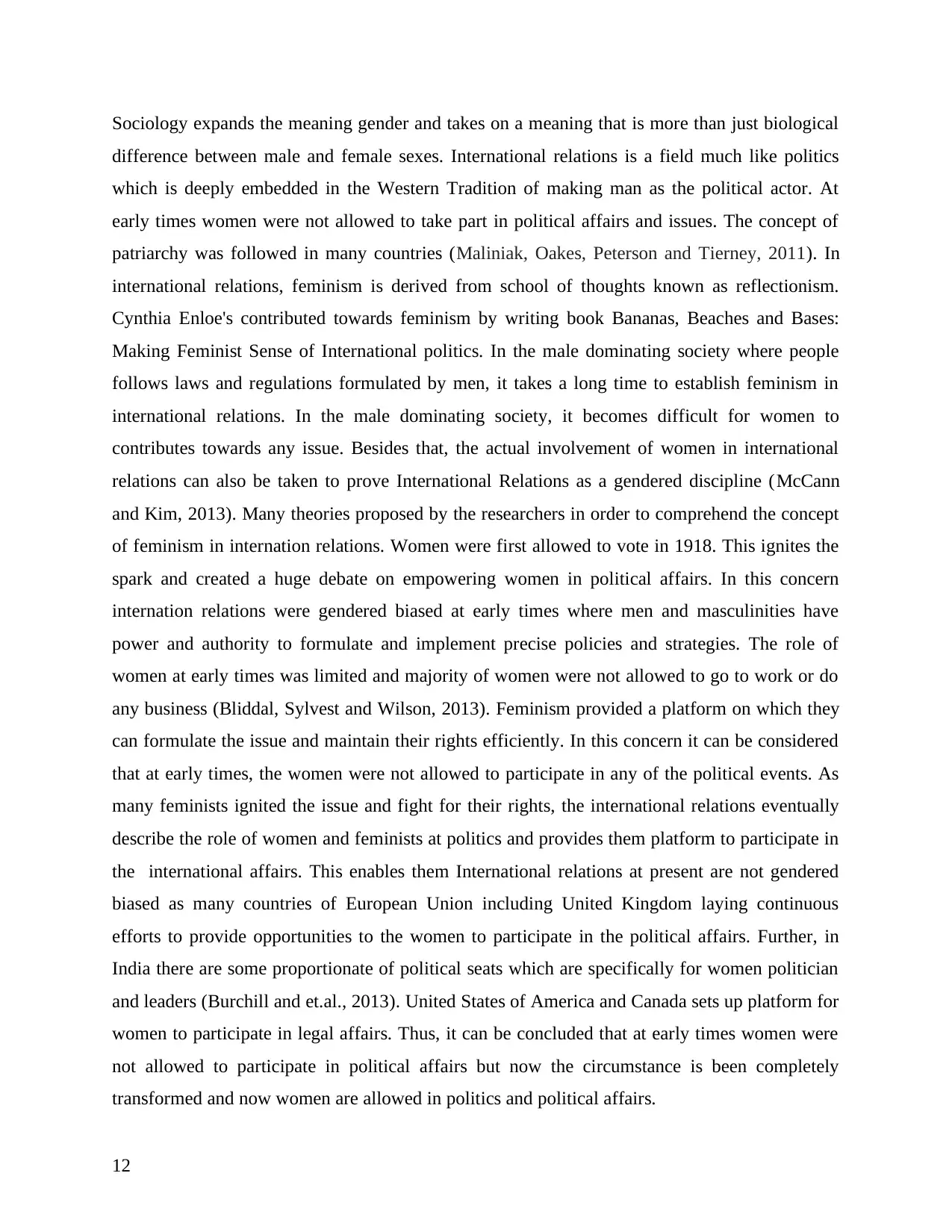
Sociology expands the meaning gender and takes on a meaning that is more than just biological
difference between male and female sexes. International relations is a field much like politics
which is deeply embedded in the Western Tradition of making man as the political actor. At
early times women were not allowed to take part in political affairs and issues. The concept of
patriarchy was followed in many countries (Maliniak, Oakes, Peterson and Tierney, 2011). In
international relations, feminism is derived from school of thoughts known as reflectionism.
Cynthia Enloe's contributed towards feminism by writing book Bananas, Beaches and Bases:
Making Feminist Sense of International politics. In the male dominating society where people
follows laws and regulations formulated by men, it takes a long time to establish feminism in
international relations. In the male dominating society, it becomes difficult for women to
contributes towards any issue. Besides that, the actual involvement of women in international
relations can also be taken to prove International Relations as a gendered discipline (McCann
and Kim, 2013). Many theories proposed by the researchers in order to comprehend the concept
of feminism in internation relations. Women were first allowed to vote in 1918. This ignites the
spark and created a huge debate on empowering women in political affairs. In this concern
internation relations were gendered biased at early times where men and masculinities have
power and authority to formulate and implement precise policies and strategies. The role of
women at early times was limited and majority of women were not allowed to go to work or do
any business (Bliddal, Sylvest and Wilson, 2013). Feminism provided a platform on which they
can formulate the issue and maintain their rights efficiently. In this concern it can be considered
that at early times, the women were not allowed to participate in any of the political events. As
many feminists ignited the issue and fight for their rights, the international relations eventually
describe the role of women and feminists at politics and provides them platform to participate in
the international affairs. This enables them International relations at present are not gendered
biased as many countries of European Union including United Kingdom laying continuous
efforts to provide opportunities to the women to participate in the political affairs. Further, in
India there are some proportionate of political seats which are specifically for women politician
and leaders (Burchill and et.al., 2013). United States of America and Canada sets up platform for
women to participate in legal affairs. Thus, it can be concluded that at early times women were
not allowed to participate in political affairs but now the circumstance is been completely
transformed and now women are allowed in politics and political affairs.
12
difference between male and female sexes. International relations is a field much like politics
which is deeply embedded in the Western Tradition of making man as the political actor. At
early times women were not allowed to take part in political affairs and issues. The concept of
patriarchy was followed in many countries (Maliniak, Oakes, Peterson and Tierney, 2011). In
international relations, feminism is derived from school of thoughts known as reflectionism.
Cynthia Enloe's contributed towards feminism by writing book Bananas, Beaches and Bases:
Making Feminist Sense of International politics. In the male dominating society where people
follows laws and regulations formulated by men, it takes a long time to establish feminism in
international relations. In the male dominating society, it becomes difficult for women to
contributes towards any issue. Besides that, the actual involvement of women in international
relations can also be taken to prove International Relations as a gendered discipline (McCann
and Kim, 2013). Many theories proposed by the researchers in order to comprehend the concept
of feminism in internation relations. Women were first allowed to vote in 1918. This ignites the
spark and created a huge debate on empowering women in political affairs. In this concern
internation relations were gendered biased at early times where men and masculinities have
power and authority to formulate and implement precise policies and strategies. The role of
women at early times was limited and majority of women were not allowed to go to work or do
any business (Bliddal, Sylvest and Wilson, 2013). Feminism provided a platform on which they
can formulate the issue and maintain their rights efficiently. In this concern it can be considered
that at early times, the women were not allowed to participate in any of the political events. As
many feminists ignited the issue and fight for their rights, the international relations eventually
describe the role of women and feminists at politics and provides them platform to participate in
the international affairs. This enables them International relations at present are not gendered
biased as many countries of European Union including United Kingdom laying continuous
efforts to provide opportunities to the women to participate in the political affairs. Further, in
India there are some proportionate of political seats which are specifically for women politician
and leaders (Burchill and et.al., 2013). United States of America and Canada sets up platform for
women to participate in legal affairs. Thus, it can be concluded that at early times women were
not allowed to participate in political affairs but now the circumstance is been completely
transformed and now women are allowed in politics and political affairs.
12
⊘ This is a preview!⊘
Do you want full access?
Subscribe today to unlock all pages.

Trusted by 1+ million students worldwide
1 out of 15
Related Documents
Your All-in-One AI-Powered Toolkit for Academic Success.
+13062052269
info@desklib.com
Available 24*7 on WhatsApp / Email
![[object Object]](/_next/static/media/star-bottom.7253800d.svg)
Unlock your academic potential
Copyright © 2020–2026 A2Z Services. All Rights Reserved. Developed and managed by ZUCOL.





